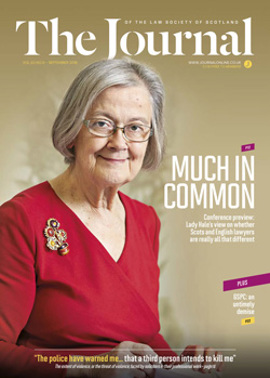Scottish Solicitors' Discipline Tribunal
Michael Alastair Inkster
A complaint was made by the Council of the Law Society of Scotland against Michael Alastair Inkster, solicitor, 159 Commercial Street, Lerwick. The Tribunal found the respondent not guilty of professional misconduct, but decided to remit the complaint to the Society in terms of s 53ZA of the Solicitors (Scotland) Act 1980.
Breach of the accounts rules is generally a serious matter and will often constitute professional misconduct even in the absence of dishonesty. The accounts rules provide important protection for the public and solicitors. Careful regard to the rules sustains public trust in the profession. Likewise, it is essential to prevent money laundering and other crimes that solicitors exercise due diligence with regard to identification of clients and source of funds. Cooperation with one’s regulator is an important part of belonging to a regulated profession. Failure to do so hampers the Society in the exercise of its duties and demeans the reputation of the profession.
However, in this case, the admitted breaches of the rules (which related mainly to historical client balances, out of date cheques and minor accounting discrepancies) were serious but not so grave that they could be described as reprehensible when considered in context. The Tribunal considered that the respondent had provided reasonable cooperation to the complainers. However, the other conduct libelled fell short of the standards expected of competent and reputable solicitors. Although it was not serious and reprehensible, in general it had been unacceptable and might amount to unsatisfactory professional conduct. The Tribunal accordingly remitted the complaint under s 53ZA of the Solicitors (Scotland) Act 1980 to the Council of the Society for consideration.
Steven Archibald Murray
A complaint was made by the Council of the Law Society of Scotland against Steven Archibald Murray, The MMFW Partnership Solicitors, 917 Shettleston Road, Glasgow. The Tribunal found the respondent guilty of professional misconduct singly and in cumulo in respect that (a) he took fees without or before rendering fee notes and failed to provide sufficient information to demonstrate that his firm was entitled to fees taken; (b) he failed to provide evidence of anti-money laundering procedures relating to risk assessments being carried out; (c) between June 2013 and January 2014, he failed to provide reasonable cooperation with the investigations of the Financial Compliance department inspectors; (d) as cashroom partner, he breached the accounts rules and failed to comply with his responsibilities as cashroom manager in that (i) as at 30 April 2014 his firm had failed to make postings to its records since 31 March 2014; and (ii) he delayed in rectifying the daybooks; and in cumulo in respect that (a) when asked to provide details of information and reconciliations to beneficiaries, he failed to provide adequate information, it was misleading and the sums did not balance; (b) he withdrew £1,618.75 from an executry that was not properly required for his firm’s professional account; (c) he delayed in finalising an estate and sending the file to be assessed for fees; and (d) he failed to provide evidence of appropriate risk assessments or client identification or procedures relating to funds being paid to a third party, as a result of which he was unable to demonstrate to the complainers that appropriate due diligence measures in view of the risks of money laundering or terrorist financing had been taken.
The Tribunal censured the respondent and fined him in the sum of £1,000.
The Tribunal accepted that there was no suggestion of dishonesty or lack of integrity on the part of the respondent. However, members of the profession are in a privileged position in handling clients’ funds. The accounts rules carefully control the solicitor’s conduct to protect the client. A solicitor’s intromissions with clients’ funds require to be transparent and authorised. The rendering of appropriate fee notes is therefore necessary. Members of the profession must comply with the anti-money laundering regulations to protect the public and the reputation of the profession. Members of the profession must cooperate with the Society as its regulatory body. This maintains public confidence in the profession.
William Lawson Criggie
A complaint was made by the Council of the Law Society of Scotland against William Lawson Criggie, formerly at Carlton Building, 63 Carlton Place, Glasgow and now at 137 Sauchiehall Street, Glasgow. The Tribunal found the respondent guilty of professional misconduct in respect that he failed or delayed to respond to correspondence and statutory notices issued by the Scottish Legal Complaints Commission and the complainers. The Tribunal censured the respondent.
The Tribunal had regard to many previous cases where the Tribunal had held that failure to respond to the Society hampers the regulator in the performance of its statutory duty to deal with conduct complaints and brings the profession into disrepute.
In this issue
- Confidence restored: internal investigations and legal privilege
- Court reforms: still an unknown quantity
- Ruled out of court?
- Uncovering the environment (1)
- Medical death: a case to answer
- Reading for pleasure
- Opinion: Kerry Trewern and Rhona McNair
- Book reviews
- Profile: Ryan McCuaig
- President's column
- Developing digital services
- People on the move
- Leading judgment
- Health check
- Open to attack
- Claims: beating the trigger
- Storage: time for digital
- GSPC: eulogy for a friend
- Relevant persons: a challenge
- New specialist land registration practice launches
- Good enough reason?
- Copyright: underpinning control
- Writing means writing
- Rent moves: two crucial hoops
- Debtor wins in policy decision
- Scottish Solicitors' Discipline Tribunal
- KIR: the time bomb explodes
- The guideline goal
- GC NextGen: a network for you?
- Your Law Society of Scotland Council members
- Public policy highlights
- Double boost for Society's AML team
- Ask Ash
- Practice rights and the impact of Brexit: working in the EU
- Acting as notary: what do I need to know?
- Engagement letters: a practical approach
- Uncovering the environment
- Paralegal pointers






